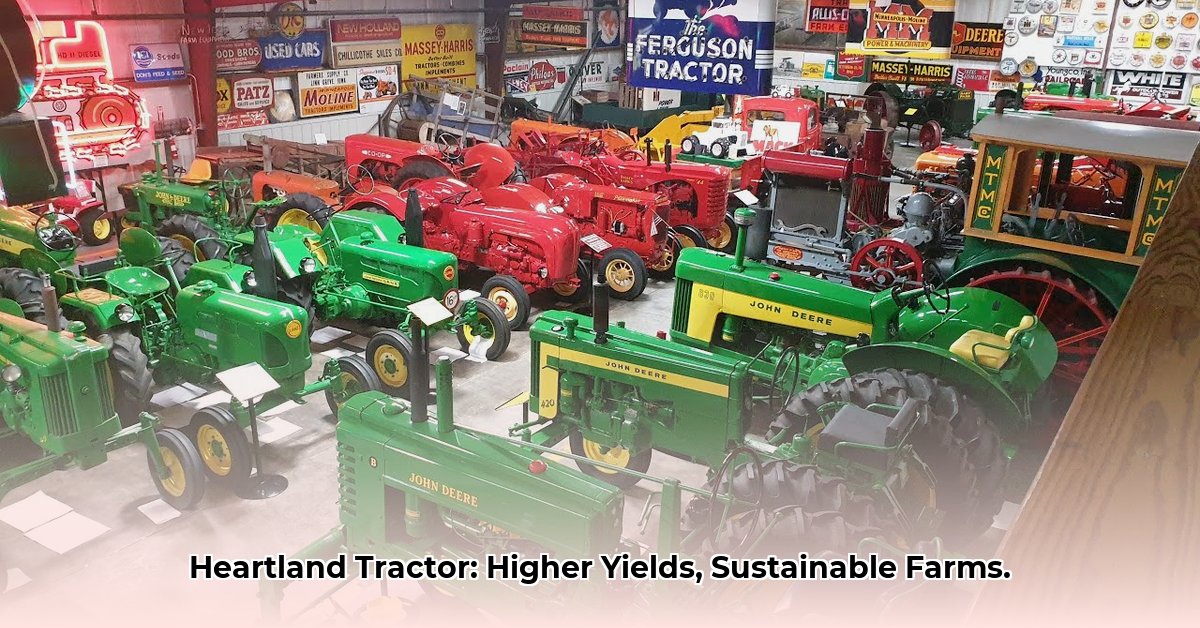
Heartland Tractor Harrisonville: A Partner in Sustainable Farming
Farming in Harrisonville, Missouri demands both hard work and shrewd decision-making. Heartland Tractor Harrisonville has established itself as a vital partner for local farmers, providing not just equipment but also the expertise necessary for long-term success. Their contribution extends beyond simply selling tractors; they are actively shaping a more sustainable future for agriculture in the region. This article explores how Heartland Tractor empowers farmers to increase yields while minimizing environmental impact, examining their services, the equipment they offer, and their potential for even greater contributions to sustainable farming. For more options, check out other reputable brands like Kubota tractors.
Heartland Tractor Harrisonville offers a comprehensive package: sales of high-quality tractors and harvesting equipment, expert maintenance services, and readily available parts. This holistic approach ensures farmers can focus on their crops, rather than equipment downtime. But their contribution goes deeper than reliable equipment.
Efficiency: The Foundation of Sustainable Agriculture
While Heartland Tractor Harrisonville doesn't explicitly advertise specific sustainability metrics, their impact is undeniable. Providing farmers with efficient, high-performance machinery directly contributes to a greener agricultural approach. Modern, fuel-efficient tractors, for example, reduce fuel consumption, lowering greenhouse gas emissions and minimizing soil compaction. Precision planting technologies further enhance sustainability by optimizing seed placement and fertilizer application, resulting in healthier crops and reduced waste. Although specific quantifiable data remains to be collected, the potential for significant environmental gains is substantial through improved resource efficiency. This potential represents a significant opportunity for future growth.
Addressing Challenges, Embracing Opportunities
Like any business, Heartland Tractor faces challenges, including supply chain disruptions, fluctuating fuel prices, and evolving regulations. However, these present opportunities for innovation and growth. By proactively adapting—for example, by investing in even more fuel-efficient machinery or partnering with suppliers committed to sustainable manufacturing—Heartland Tractor can further strengthen its position as a leader in responsible agriculture. Embracing these challenges is key to their ongoing success and demonstrates a commitment to sustainability.
Customer Success Stories: Testimonials
*[Space for customer testimonials. Include short quotes from satisfied customers illustrating the positive impact of Heartland Tractor's services on their farming operations. Example: "Since switching to Heartland’s fuel-efficient tractors, my fuel costs are down significantly, and yields are up," or "Heartland's service team is exceptional; they always get me back up and running quickly."] * These firsthand accounts provide compelling evidence of Heartland Tractor's value.
Heartland Tractor's Future: A Vision for Sustainable Practices
Heartland Tractor plays a vital role within the Harrisonville agricultural community. Their support of efficient farming indirectly contributes to environmental protection. However, increased transparency regarding their environmental footprint could further enhance their reputation and build stronger customer relationships. Publicly committing to measurable sustainability goals, such as reducing carbon emissions by a certain percentage over a defined period, would demonstrate their dedication to a greener future. This commitment could be a powerful tool in their future strategy.
Actionable Steps Toward a Sustainable Future
The following outlines actionable steps for stakeholders to advance sustainable farming:
Heartland Tractor:
- Conduct a comprehensive environmental impact assessment within the next year. This must include quantifiable data to measure their baseline and subsequent progress.
- Prioritize sourcing parts from suppliers committed to sustainable manufacturing within three years. This can be achieved through partnerships with businesses demonstrating a strong environmental commitment.
- Develop a comprehensive sustainability plan with measurable, long-term goals within five years. This plan should include specific targets for reducing emissions, optimizing resource use, and minimizing waste.
Farmers:
- Optimize equipment usage by prioritizing preventative maintenance and efficient farming practices within the year. This can minimize fuel consumption and maximize yields while reducing environmental impact.
- Implement conservation tillage techniques over the next three years. These farming practices improve soil health, reduce erosion, and minimize the use of potentially harmful chemicals.
- Fully adopt precision agriculture technologies within five years. This will enhance efficiency, reduce waste, and maximize yields while promoting sustainable farming practices.
Government Agencies:
- Partner with local businesses to fund sustainable agricultural programs within the next year. This could involve offering financial incentives for environmentally friendly practices.
- Create stricter environmental regulations with increased funding for sustainable agricultural research within three years. This will promote the development and widespread adoption of greener technologies and farming practices.
Suppliers:
- Prioritize sustainable manufacturing processes and reduced emissions within the next year. This is essential for providing sustainable farming equipment and supplies.
- Collaborate on designing more environmentally friendly equipment and increase the utilization of recycled and sustainable materials over the next five years.
The future of agriculture in Harrisonville and beyond depends on innovation and sustainability. Heartland Tractor is uniquely positioned to take a leading role in this transformation. Through collaboration and commitment, farmers, the government, and the agricultural industry can build a more sustainable and prosperous agricultural future.
Key Takeaways:
- Heartland Tractor's focus on durable equipment and reliable service indirectly supports sustainable practices.
- Missouri farmers can enhance sustainability by selecting fuel-efficient equipment and implementing precise farming techniques.
- Heartland Tractor's commitment to sustainability would significantly benefit from quantifying their environmental impact through metrics and public reporting.
- Government incentives and collaborations between organizations can significantly accelerate the adoption of sustainable farming practices.